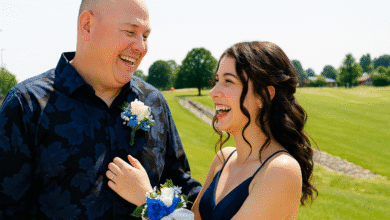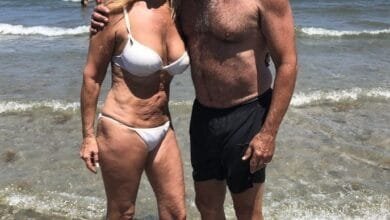The Wheelchair That Transformed Two Lives…
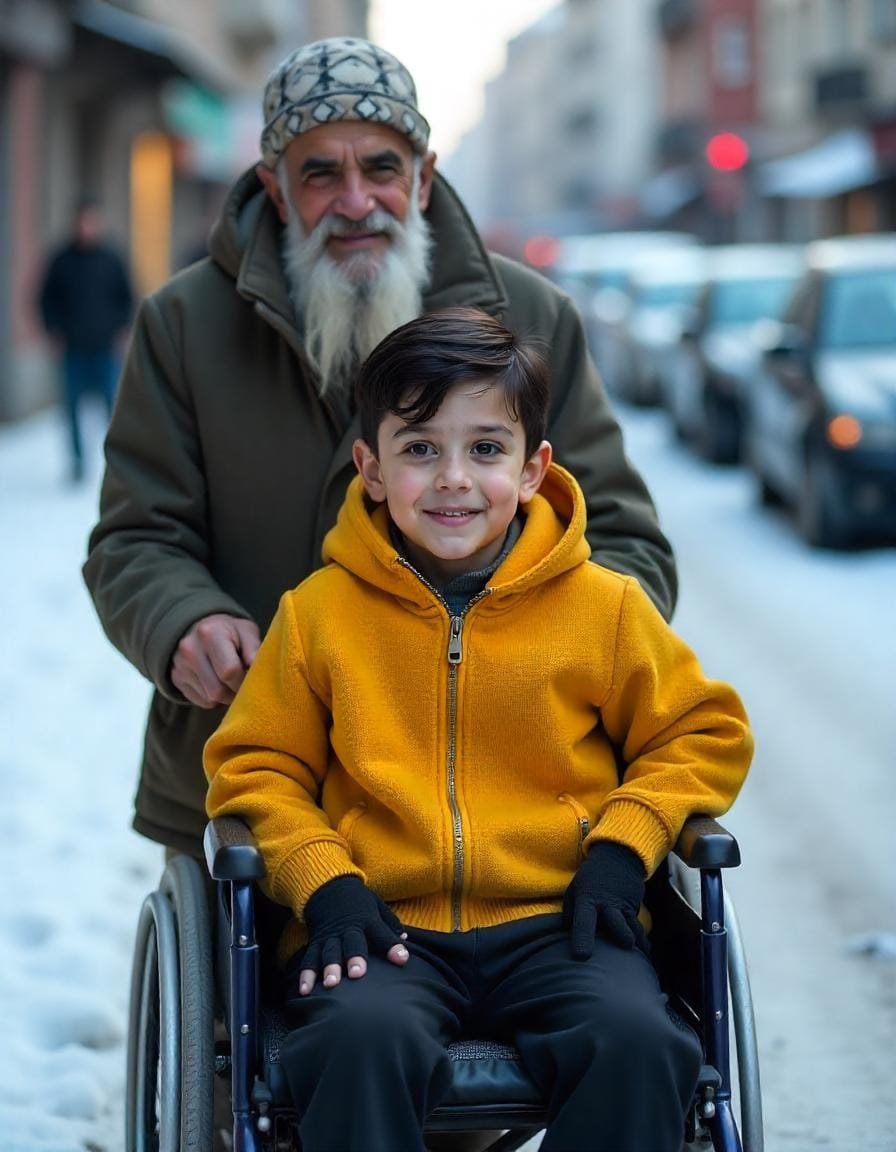
A homeless and disabled flutist sacrifices his only lifeline — his wheelchair — for an 8-year-old boy who cannot walk, hiding his own pain to spare them worry. Five years later, the boy returns, standing tall, with a gift that would change everything.
I was playing in my usual spot in the city square when I met the boy for the first time. My fingers moved over the holes of the flute by sheer muscle memory, while my mind wandered, as it often did during my daily performances.
Fifteen years of living on the streets had taught me to find escape wherever possible, and music was the only thing that truly distracted me from the constant buzzing pain in my lower back and hips. I closed my eyes and let the melody take me to another time and place.
I used to work in a factory. It was tough work, but I loved the rhythm, the way the body settles into a flow that feels like dancing.
Then the pain began. I was around 45, and at first, I blamed age. But when I started struggling to keep up at work, I knew I had to see a doctor.
— “It’s a chronic condition that will only get worse over time,” the doctor said. “Especially with the kind of labor you do. There are medications to manage the pain, but I’m afraid there’s no cure.”
I was stunned. The next day, I begged my boss to transfer me to another department.
— “I could do quality control or shipment inspection,” I suggested.
But he shook his head.
— “You’re a good worker, but company policy requires certifications for those roles. Upper management would never approve it.”
I held on as long as I could, but eventually, they let me go — I just wasn’t physically fit for the job anymore. The guys at the factory knew about my condition and how much pain I was in.
On my last day, they gave me a gift I’ve cherished ever since: my wheelchair.
A child’s voice snapped me out of my thoughts and pulled me back to the square.
— “Mom, listen! It’s so beautiful!”
I opened my eyes to see a small crowd had gathered, including a tired-looking woman carrying a boy of about eight years old.
The boy’s eyes sparkled with wonder as he watched my fingers move across the flute. His mother’s face showed exhaustion, but seeing her son’s joy softened her expression.
— “Can we stay a little longer?” the boy asked, tugging at her worn jacket. “Please? I’ve never heard music like this.”
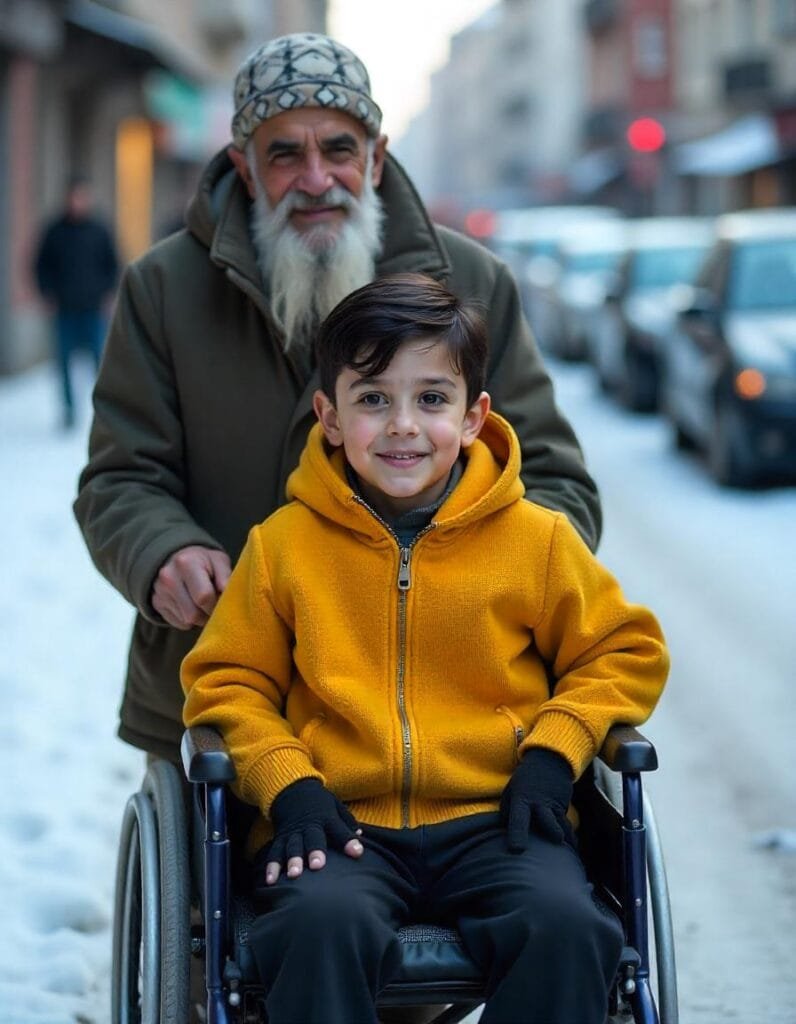
She adjusted her grip on him, trying to mask the effort.
— “Just a few more minutes, Tommy. We have to get to your appointment.”
— “But Mom, look how his fingers move! It’s like magic.”
I lowered the flute and pointed toward the boy.
— “Would you like to try? I could teach you a simple melody.”
Tommy’s face fell.
— “I can’t walk. It hurts too much.”
His mother tightened her arms around him.
— “We can’t afford crutches or a wheelchair,” she explained quietly. “So I carry him everywhere. The doctors say he needs physical therapy, but…” She trailed off, her eyes heavy with silent burdens.
Looking at them, I saw my own story reflected back. The pain, the constant struggle for dignity, the way society overlooks those who are poor and disabled.
But in Tommy’s eyes, I also saw something I had long lost: hope. That spark of joy as he listened to the music reminded me why I started playing in the first place.
— “How long have you been carrying him?” I asked, though I wasn’t sure I wanted the answer.
— “Three years,” she whispered.
I remembered my last day at the factory — the day my coworkers gave me that chair — and I knew what I had to do.
Before I could doubt myself, I gripped the arms of the wheelchair and pushed myself up. Pain shot through my spine and hips, but I forced a smile.
— “Take my wheelchair,” I said. “I… I don’t really need it. It’s just a prop. I’m not actually disabled. But it will help you and your son.”
— “Oh no, we couldn’t…” the mother protested, shaking her head.
She looked into my eyes, and I think she knew I was lying. So I smiled even wider and gently pushed the chair toward them.
— “Please,” I insisted. “It would make me happy to know someone who needs it is using it. Music isn’t the only gift we can give.”
Tommy’s eyes went wide.
— “Really, sir? You mean it?”
I nodded, unable to speak through the pain, barely keeping my smile in place.
Tears welled in his mother’s eyes as she carefully placed Tommy in the wheelchair.
— “I don’t know how to thank you. We’ve asked for help so many times, but no one ever…”
— “Your smile is enough,” I told Tommy, who was already spinning the wheels. “Both of your smiles.”
Tears filled my own eyes as I watched them go. I hobbled over to a bench and sat down, no longer pretending I wasn’t in pain.
That was five years ago. And time hasn’t been kind. Walking with crutches has worsened my condition. The pain is constant now — a sharp, gnawing stab in my back and legs — consuming my thoughts on the way from the basement I live in to the square.
But I still play. It no longer distracts from the pain, but it keeps me from losing my mind.
I often thought of Tommy and his mother, hoping that my sacrifice had made a difference. In quiet moments, I imagined him wheeling through a park or down a school hallway in my old chair, his mother finally able to stand tall with pride.
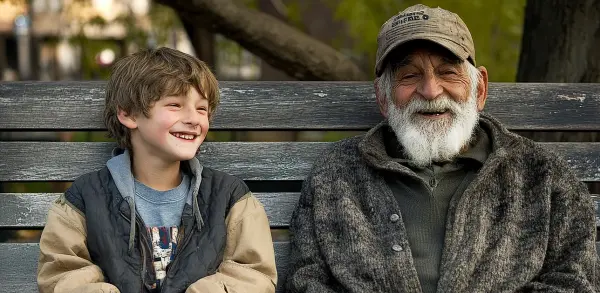
Then came the day that changed everything.
I was playing an old folk tune, one my grandmother had taught me, when a shadow fell across my tip cup.
Looking up, I saw a well-dressed teenager standing in front of me, holding a long package under one arm.
— “Hello, sir,” he said with a familiar smile. “Do you remember me?”
I frowned, my heart skipping a beat as I realized who he was.
— “You?”
Tommy grinned.
— “I was wondering if you’d recognize me.”
— “But how…?” I gestured to his upright posture. — “You’re walking!”
— “Life has a funny way of working out,” he said, sitting beside me on the bench. — “A few months after you gave us your chair, we found out a distant relative had left me an inheritance. Suddenly, we could afford proper treatment. Turns out my condition was treatable with the right care.”
— “And your mother?”
— “She started her own catering business. She always loved cooking but never had the strength for it before. Now she’s living her dream.”
Tommy looked at me, then shyly handed me the package.
— “This is for you, sir.”
— “It’s my small way of thanking you for your kindness,” he said. “For helping me when no one else would.”
— “I… I don’t know what to say,” I murmured. — “It’s too much.”
— “No, it’s not. I owe you my happiness,” Tommy said, wrapping me in a careful hug. — “The wheelchair didn’t just help me move. It gave us hope. It made us believe things could get better.”
Tommy didn’t stay long. I tucked the case into my backpack and went on with my day.
That night, back in my basement room, I opened the flute case with trembling hands. Instead of an instrument, I found neat stacks of cash — more money than I had ever seen in my life. On top, a handwritten note:
“PAYMENT FOR THE PAIN YOU ENDURED ALL THESE YEARS. Thank you for showing us that miracles still happen.”
I sat for hours holding that note, thinking about every painful step I’d taken since I gave up that chair.
But I also remembered Tommy’s smile, his mother’s tears, and the lives that had been changed.
The money meant more than financial freedom. It was proof that sometimes, the smallest acts of kindness ripple in ways we could never imagine.
— “One act of kindness,” I whispered to myself as the last light faded from the basement window. — “That’s all it takes to start a chain reaction.”


